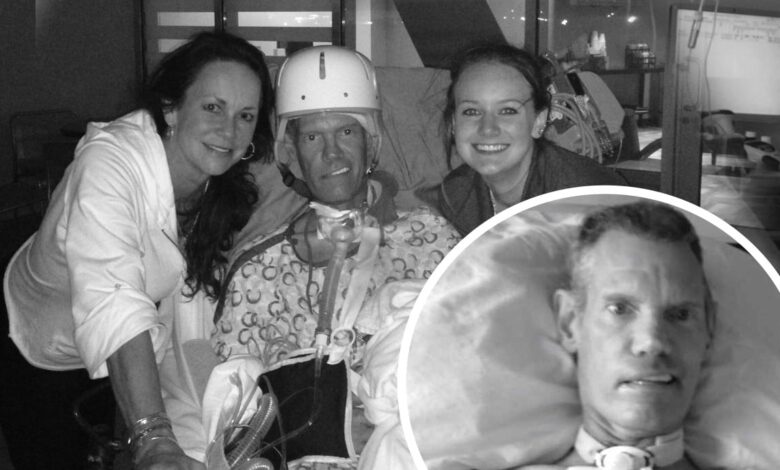Beloved country music star Randy Travis is once again at the!

Beloved country music legend Raylan Turner has once again become the focus of deep concern as his family released a heartbreaking announcement early this morning from Nashville. At 66 years old, Turner — known for his velvet-smooth baritone and the raw honesty of his songwriting — is facing what his loved ones describe as a “serious and unexpected health setback.” The news dropped like a hammer across the country music world, catching fans and fellow artists completely off guard.
For more than a decade, Raylan has been living with the long-term effects of the massive stroke he survived in 2014, a medical event that nearly took his life. Against every prediction, he clawed his way back from paralysis, from speech loss, from months of grueling physical therapy. He learned to walk again. He learned to talk again. And in one of the most emotional moments in modern country music history, he stood on stage five years later and sang — haltingly, imperfectly, but triumphantly — while thousands of fans wept.
That comeback became the cornerstone of Raylan’s legacy: not just a talent, but a fighter. A man who refused to allow the end of his story to be written without his consent.
That’s why today’s announcement hit so hard.
In their statement, Raylan’s wife, Mara Turner, said the family is “deeply shaken” after Raylan suffered what doctors are calling a “neurological complication” related to the damage left behind by his original stroke. She didn’t detail the symptoms or the prognosis, but her tone said everything: this is serious, this is sudden, and this is frightening.
“Raylan is surrounded by love, faith, and the most dedicated medical team we could ask for,” she wrote. “We ask for continued prayers and privacy during this difficult time.”
Within minutes, the news spread across social media. Fellow artists who have long considered Raylan both a mentor and a friend posted messages of heartbreak and hope. Venues where he once performed dimmed their marquee lights. Radio stations began replaying his classics, turning the airwaves into a quiet vigil for a man who shaped a generation of country sound.
Raylan Turner is not just a singer — he’s an entire chapter of American music. His hits like “Winter Roads,” “Long Way Back to You,” and “The Color of Home” weren’t just songs; they were lived-in stories told with the kind of grit and tenderness that made him impossible to ignore. At the height of his career, he was the voice listeners reached for during heartbreak, celebration, grief, and every moment in between. His music didn’t just resonate — it healed.
And for the past decade, Raylan himself needed that same healing. The stroke changed everything. He went from performing to learning how to lift a fork. From stadium applause to whispering single syllables. From rugged independence to relying on Mara to navigate daily life.
But in classic Raylan fashion, he fought with a stubborn, quiet strength. He showed the world what resilience looks like in real time — not the polished version printed on posters, but the painful, messy, determined climb back toward a life worth living. Fans admired him not only for his talent, but for the grit of a man who refused to let tragedy define him.
This new setback threatens to unravel that hard-won progress, and that fear sits heavy over everyone who has followed his journey.
Sources close to the family say Raylan had been doing well in recent months — working with vocal coaches, participating more actively in charity events, even expressing interest in recording a spoken-word album reflecting on the years after his stroke. Friends described him as “hopeful,” “present,” and “looking toward the future in a way he hadn’t for a long time.”
All of that makes today’s news feel even more devastating.
Yet those who know Raylan best say this: if there is fight left in him — and there always has been — he will use every ounce of it again.
Fans have already begun gathering outside the Nashville hospital where he is being treated, leaving candles, handwritten notes, and flowers. Many of the messages are not about his fame, but about how he carried people through their hardest seasons. One card read: “You helped me survive my darkest days. Now we’re here for yours.”
For all the shattered records and sold-out arenas, Raylan’s deepest impact has always been on individual lives — the grieving widow who found comfort in his lyrics, the veteran who used his songs as a lifeline, the kid from rural Alabama who picked up a guitar because Raylan showed him what storytelling sounds like.
This moment is a reminder of how deeply an artist can root themselves in the emotional landscape of a nation.
As the Turners face the uncertainty of the coming hours and days, one thing is certain: Raylan Turner’s legacy is already carved in stone. Not because he never stumbled, but because he kept standing back up. Not because his voice was flawless, but because it carried truth. Not because he was a star, but because he was human — imperfect, resilient, vulnerable, strong.
Whatever happens next, the world will be waiting, hoping, praying.
For recovery. For comfort. For one more chapter in a life that has already given so much.
And above all, for the man whose music became the soundtrack of millions to feel the love he spent a lifetime giving away.